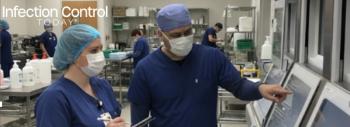
Duodenoscopes: A Complicated History Manufactures a Hopeful Future
It is in the best interest of the patient that the system moves to either disposable components or scopes, as duodenoscopes have shown a propensity for disease transmission.
In the face of outbreaks, consistent problems with high-level disinfection, and design flaws, duodenoscopes have been a hot topic in infection control and public health. Increasingly, the potential for single-use, disposable options have been promoted as a way to reduce risk to patients.
Duodenoscopes, often called ERCP scopes as they are involved in endoscopic retrograde cholangiopancreatographies (ERCP), are complex medical devices involved in more than 500,000 procedures each year in the United States. These flexible, lighted tubes are threaded through the mouth, throat, and stomach to the top of the small intestine.
Thanks to concerns regarding the design and usage, reusable scopes are starting to appear, costing around $40,000. Those concerns began to bubble up in 2013 but boiled over during an outbreak in 2015.
In 2013, the US Centers for Disease Control and Prevention (CDC) began to work with the Federal Food and Drug Administration (FDA) over concerns of drug-resistant outbreaks being linked to duodenoscope usage. More concerning, epidemiological efforts revealed that even with proper reprocessing, these infections were still occurring.
Within 2 short years, in late 2015, a cluster of carbapenem-resistant Enterobacteriaceae (CRE) were found at the University of California, Los Angeles (UCLA) Medical Center and linked to the use of duodenoscopes. By January 2016, investigations pushed by Sen. Patty Murray (D-Washington) tied 25 outbreaks to duodenoscopes.1The FDA reported that these adverse events resulted in 3 deaths, 45 patient infections, and 159 cases of device contamination related to inadequate reprocessing of the scopes.2Nineteen of these outbreaks, including the UCLA one, were traced to scopes made by Olympus. Despite CDC interim guidance, advanced disinfection practices, and a recall by Olympus last year, there was still growing concern that the issues with the scopes were not truly remedied.3
In fact, Murray highlighted a recent outbreak in Europe (location not disclosed within the FDA report) tied to the modified scopes.4Murray noted that, “It is essential that patients and doctors are confident that the devices used in medical procedures are safe, and following the tragic impacts outbreaks have had on patients and families in my home state and across the nation, I remain absolutely committed to ensuring rigorous oversight of medical device safety.”5
Although modifications made by Olympus were made in response to the previous outbreaks and meant to reduce the risk of bacteria getting into the device’s channels and preventing proper cleaning and disinfection, Murray later questioned Olympus regarding the devices and the role they played in the most recent outbreak. More specifically, Murray pushed for data proving that the repaired scopes could be properly disinfected between patient use. Olympus representatives have said the company intends to cooperate with Murray’s questions; however, this is most likely not the end of the duodenoscope dilemma.
In December 2018, the FDA provided interim results of studies it supported regarding duodenoscope reprocessing in real-world settings to help guide future recommendations.6These post-market surveillance studies were ordered by the FDA for Olympus, Fujifilm, and Pentax. The studies involved 2 parts: sampling/culturing of reprocessed scopes in clinical use to understand the chain of contamination, but also human factor studies to assess those performing the reprocessing.
The interim results indicated that, for human factor samples, the process for reprocessing is quite difficult, directions by manufacturers are confusing, and the practice is prone to missteps. In regard to the sampling/culture studies, the results revealed that, at the point where 10% of samples had been collected, there was a higher-than-expected contamination rate after reprocessing “with up to 3% of properly collected samples testing positive for enough low concern organisms to indicate a reprocessing failure and up to 3% of properly collected samples testing positive for high concern organisms.”7The FDA noted that organisms considered to be of “high concern” were those like Escherichia coli and Pseudomonas aeruginosa.
Not surprisingly, the FDA recently recommended that hospitals and endoscopy facilities transition away from those scopes with fixed endcaps to those with newer design features that either better support or totally remove the need for reprocessing.8Currently working with manufacturers, the FDA is pushing for an increased supply of disposable cap duodenoscopes and other designs that can help reduce the risk to patient safety.
In mid-December 2019, the FDA cleared the first fully disposable duodenoscope, which would wholly eliminate the need for reprocessing as it would be single-patient use.9The EXALT Model D Single-Use Duodenoscope is now the first approved disposable scope on the market. Jeff Shuren, MD, JD, director of the FDA’s Center for Devices and Radiological Health noted that “the availability of a fully disposable duodenoscope represents another major step forward for improving the safety of these devices, which are used in more than 500,000 procedures in the U.S. each year. Unlike duodenoscopes that are used on multiple patients, a fully disposable duodenoscope doesn’t need to be reprocessed, eliminating the risk of potential infection due to ineffective reprocessing.”
Other recommendations for these devices included:
· Ensuring staff are meticulously following reprocessing instructions.
· Instituting a quality control program that includes sampling and microbiological culturing, and other monitoring methods.
· Considering reprocessing with supplemental measures such as sterilization or use of a liquid chemical sterilant processing system consistent with the device’s labeling.
· Monitoring reprocessing procedures. Examples of monitoring are sampling and culturing using the Duodenoscope Surveillance Sampling & Culturing: Reducing the Risks of Infection developed by the FDA-Centers for Disease Control and Prevention-American Society of Microbiology Working Group on Duodenoscope Culturing.
· Developing schedules for routine inspection and periodic maintenance in accordance with the duodenoscope manufacturer’s instructions.
The FDA also noted that patients should be aware of the risks but that ultimately, they are quite low given the work that has gone into reprocessing protocols, and not to cancel or delay any planned procedure without having a discussion with their provider.
The culture of duodenoscopes is changing as efforts like those from Murray and the FDA have put pressure on device manufacturers to be proactive in their efforts to enhance patient safety. The ease at which these devices support the transmission of drug-resistant organisms is one that also falls into those efforts combatting antimicrobial resistance.
In the face of this transitionary period, there is still a need at a healthcare facility-level to perform internal reviews, maintain close relationships, and conduct annual risk assessments. Infection prevention efforts must include observation and assessments of those reprocessing practices to not only ensure regulatory compliance, but also be proactive in opportunities for improvement.
Although the cost of the newly approved single-use scope is not available, making the case to hospital administrators is likely to be a challenge. However, it is in the best interest of the patient that the system moves to either disposable components or scopes, as duodenoscopes have shown a propensity for disease transmission and are prone to human factor failures. As more attention is focused on duodenoscopes, reprocessing, and now the availability for single-use devices, it will hopefully spur more innovation to push the industry to entirely remove the need for reprocessing.
Saskia v. Popescu, PhD, MPH, MA, CIC, is a hospital epidemiologist and infection preventionist. During her work as an infection preventionist, she performed surveillance for infectious diseases, preparedness, and Ebola-response practices. She holds a doctorate in biodefense from George Mason University where her research focuses on the role of infection prevention in facilitating global health security efforts. She is certified in infection control and has worked in both pediatric and adult acute care facilities.
References:
1. U.S. Senate, Health Education, Labor, and Pension Committee. Preventable tragedies: superbugs and how ineffective monitoring of medical device safety fails patients – minority staff report. 1-13-16. Accessed January 9, 2020 from https://www.help.senate.gov/imo/media/doc/Duodenoscope%20Investigation%20FINAL%20Report.pdf.
2. David Lim. Sen. Murray renews scrutiny of duodenoscope makers. MedTechDive. 5-13-19. Accessed on January 13, 2020. https://www.medtechdive.com/news/sen-murray-renews-scrutiny-of-duodenoscope-makers/554547/.
3. Petersen. M. U.S. senator seeks data on infection outbreak linked to ‘repaired’ Olympus scope. Los Angeles Times. 4-4-17. LAT website. Accessed January 13, 2020. https://www.latimes.com/business/la-fi-senator-letter-olympus-scope-20170404-story.html
4. Petersen, M. Olympus’ redesigned scope is linked to infection outbreak. Los Angeles Times, 3-22-17. LAT website. Accessed January 13, 2020. https://www.latimes.com/business/la-fi-olympus-scope-outbreak-20170322-story.html.
5. Following new reports of drug-resistant outbreak, Sen. Murry calls on Olympus to verify medical scopes are safe for use in U.S. office of Senator Patty Murray. 4-4-17. Accessed on January 13, 2020. https://www.murray.senate.gov/public/index.cfm/2017/4/following-new-reports-of-drug-resistant-outbreak-sen-murray-calls-on-olympus-to-verify-medical-scopes-are-safe-for-use-in-u-s.
6. Food and Drug Administration. The FDA provides interim results of duodenoscope reprocessing studies conducted in real-world settings: FDA safety communication. FDA website. 12-10-18. Accessed January 11, 2020. https://www.fda.gov/medical-devices/safety-communications/fda-provides-interim-results-duodenoscope-reprocessing-studies-conducted-real-world-settings-fda.
7. Food and Drug Administration. The FDA provides interim results of duodenoscope reprocessing studies conducted in real-world wettings: FDA safety communication. FDA website. 12-10-18. Accessed January 11, 2020. https://www.fda.gov/medical-devices/safety-communications/fda-provides-interim-results-duodenoscope-reprocessing-studies-conducted-real-world-settings-fda.
8. Food and Drug Administration. The FDA is recommending transition to duodenoscopes with innovative designs to enhance safety: FDA safety communication. 2020. FDA website. Accessed January 10, 2020. https://www.fda.gov/medical-devices/safety-communications/fda-recommending-transition-duodenoscopes-innovative-designs-enhance-safety-fda-safety-communication
9. Food and Drug Administration. FDA clears first fully disposable duodenoscope, eliminating the potential for infections caused by ineffective reprocessing. FDA News Release 12-13-19. Accessed January 10, 2020. https://www.fda.gov/news-events/press-announcements/fda-clears-first-fully-disposable-duodenoscope-eliminating-potential-infections-caused-ineffective.
Newsletter
Stay prepared and protected with Infection Control Today's newsletter, delivering essential updates, best practices, and expert insights for infection preventionists.




